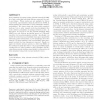Free Online Productivity Tools
i2Speak
i2Symbol
i2OCR
iTex2Img
iWeb2Print
iWeb2Shot
i2Type
iPdf2Split
iPdf2Merge
i2Bopomofo
i2Arabic
i2Style
i2Image
i2PDF
iLatex2Rtf
Sci2ools
124
click to vote
MOBIHOC
2008
ACM
2008
ACM
Routing in a cyclic mobispace
A key challenge of routing in delay tolerant networks (DTNs) is to find routes that have high delivery rates and low endto-end delays. When oracles are not available for future connectivity, opportunistic routing is preferred in DTNs, in which messages are forwarded to nodes with higher delivery probabilities. We observe that real objects have repetitive motions, but no prior research work has investigated the cyclic delivery probability of messages between nodes. In this paper, we propose to use the expected minimum delay (EMD) as a new delivery probability metric in DTNs with repetitive but non-deterministic mobility. Specifically, we model the network as a probabilistic time-space graph with historical contact information or prior knowledge about the network. We then translate it into a probabilistic state-space graph in which the time dimension is removed. Finally, we apply the Markov decision process to derive the EMDs of the messages at particular times. Our proposed EMD-based r...
Cyclic Delivery Probability | Delay Tolerant Networks | MOBIHOC 2008 | Opportunistic Routing Protocols | Wireless Networks |
Related Content
| Added | 24 Dec 2009 |
| Updated | 24 Dec 2009 |
| Type | Conference |
| Year | 2008 |
| Where | MOBIHOC |
| Authors | Cong Liu, Jie Wu |
Comments (0)

